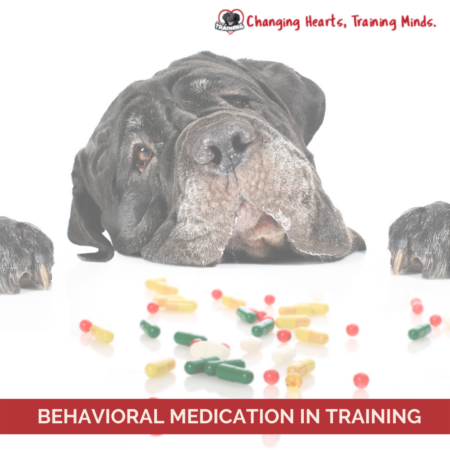Let me first start this post with my standard disclaimer: I AM NOT A VET. But as a trainer who specializes in fear, aggression, reactivity and separation anxiety, I have a lot of clients who benefit greatly from anti-anxiety medication to help them live happier, healthier, safer and fuller lives. But it is not my roll to tell you if your dog should be on medication or what medication that might be. I can discuss what has worked for other clients or my personal anecdotal experiences but medication is always a conversation for you and your vet or a vet behaviorist.
Also, disclaimer: I am pro-meds when they can help. I have a pro-meds intervention bias when the dog is struggling. I am pro-science and evidence based studies. This means I will not recommend you ever give your dog things that do not have peer-reviewed evidence to support efficacy or safeness. They are also NEVER the solution alone. We always need to do training in conjunction with medication and many vets will not prescribe meds unless they know you are also working with a qualified trainer.
I also understand the decision about meds can be a touchy and personal one for some people. Just like in human mental health where there are often a lot of stigmas about those illnesses and medication, the same is true for dogs. Some people are firmly planted in the “I don’t want to medicate my dog.” And while I understand that as a gut reaction, this could mean prolonging your dog’s mental suffering. I do not think every dog should be on meds or benefits from meds. But many fearful, aggressive or anxious dogs (whatever their “issue” is) can benefit greatly from meds.
If I have a headache, I take Advil, because I know it will give me relief, is generally safe and can improve my situation by helping me feel better. Why would I suffer unnecessarily when I can take something that is proven safe and effective? I don’t win an award for pushing through my headache without meds. I’m not a failure if I decide to take some Advil. In fact, by taking it, I’m able to function better, think more clearly and help my clients, whereas if I didn’t take it, could I still work? Sure, maybe. But I probably wouldn’t be at the top of my game and I certainly wouldn’t be feeling great.
Let me address some common concerns or myths about meds:
- They will make my dog a zombie. If this happens, then that’s not the right medication for your dog. The goal of anti-anxiety meds is never to sedate the dog so they’re a zombie. Just like with human drugs, there isn’t a one med fits all and it can take some trial and error to get the right med or combination of meds to work. But the right med should help you dog be more comfortable/less anxious, help him rebound from stressful situations more quickly and help make training more effective and efficient.
- Meds will change my dog’s personality. During the first few days a new medication is introduced it is a common short term side effect to have some lethargy or appetite reduction, but that usually passes within a few days. Dogs should retain their personality, playfulness and energy level. If not, this isn’t the right medication. It can make them more relaxed, more playful, more confidence and faster learners though, because once their brain chemicals are balanced properly, and they’re less worried about bad things happening, that can really open up their real, less anxious side.
- There are “natural” solutions that will do the same thing. No, there aren’t. Only pharmaceutical medications have been tested, approved and are FDA regulated. Holistic or natural chews, supplements are not FDA regulated, have no tested dosing instructions, could potentially interact with other medications (like preventatives or other drugs) and usually aren’t effective at all. The only canine studies for CBD effectiveness have been done for seizures and arthritis pain but to date, there have been no studies for behavior and CBD that indicate any statistically significant decrease in aggression or in cortisol levels. There was this one shelter study (only 24 dogs, so very poor sample size) that showed “reduced aggressive behavior toward humans following the treatment but the difference in the decrease of aggressive behavior between the two groups was not significant. Other behaviors indicative of stress, such as displacing activities and stereotypes, did not decrease.” Many people will anecdotally say their dog is better on CBD but I suspect that is a bit of a placebo effect on the human. I look forward to the day when we have more evidence on CBD or other alternative treatments but until then, if your dog is so anxious or fearful that you feel you need to give them something to help them, it likely needs to be real drugs. A Thundershirt, pheromone-sprayed bandana and calming chew isn’t going to cut it.
- They’re expensive. Some can be – just like human meds. But many are quite affordable. Some are even the same as human meds and can be gotten at a regular pharmacy using GoodRx or other discount cards. I get my dog’s anti-anxiety medication at Costco and it costs me $7 a month.
- I don’t want my dog on meds for his whole life. Sometimes dogs do need to stay on medication long-term but it’s also true that many dogs can be weaned off them. It all depends on the dog, the triggers and that dog’s particular situation. Many clients attempt a wean off, see how it goes and if the dog has a regression, they go back to the meds. In these cases, it could be there is a genetic factor causing a brain chemical imbalance and the medication helps stabilize that.
When is medication appropriate? This is a good question and one really for your vet. But I will refer clients for a meds consult if the dog is presenting with signs of generalized anxiety (afraid of many things, like walking outside), separation anxiety. (panic disorder where the dog has a phobia of being left alone), has serious stranger danger or guarding, is very fearful or anxious of children/toddlers/babies or if training has plateaued or regressed, even though we’re doing all the right things. I will also refer for suspected pain and noise sensitivities (loud noises, thunder, fireworks, baby crying, etc.).
Also important to note, many general vets do not have extensive knowledge about behavior meds or are resistant to prescribing them, which is why we have veterinary behaviorists (VBs). They are vets who are essentially doggy psychiatrists. It takes about 12 years to become one and there’s less than 100 of them worldwide. But they are the vets who specialize in behavior, fear, aggression, anxiety and medication. While your regular human doctor can give you something to help you fly or sleep, if you have bipolar or depression, you’d likely see a psychiatrist to help manage your meds or cocktail of meds and work on the therapeutic side of things. This is what a VB is for dogs.
I maintain relationships with several VBs across the country since all of my sessions with clients are remote, including those that do vet to vet consults. I can help you connect with the help you need and having the vet and client and trainer all looped in and working together symbiotically helps case outcomes.
Can I do training and work with you without medication? Absolutely. Many dogs do not benefit from medication. But often fearful or anxious dogs do benefit from it. This is something we discuss during our initial consult. My favorite article on this topic from a behavior vet is this one from Dr. Jen Summerfield: Behavior Medication: First Line Therapy or Last Resort?
This sums it up. We can look at meds as first line of defense – throwing everything we can at the dog right from the start – good training, management and medication to help set the dog up for success right away. Or, we can try training and management alone and see how it goes and pull in meds later on if we’re not as successful as we’d hoped. The risk of waiting is you potentially waste time, money and resources on training that isn’t as effective as it might be with meds on board. And this also means your dog has been suffering longer than they needed to before getting relief. And then if we need to pull in meds, often there is a load-in period for many medications up to around 6 weeks, so that could mean it would take another 6 weeks to get training to a level that we could have done much earlier on. These are all things to think about when deciding about medication for your dog.
One final note. Dogs are very stoic creatures. Pain or other physical issues can cause behavior changes. Any sudden behavior change, whether it’s a lapse in housetraining, sudden reactivity, a pop out in separation anxiety or anything else new, requires a vet check. I’ve had many clients who had undiagnosed pain, which was causing behavior issues. When the pain or GI upset gets addressed, the behavior returns to normal. I recently had a new separation anxiety client contact me and after some discussion, I referred her to the vet for a pain consult, based on her age and some history. Sure enough, after a few weeks on a pain meds trial, the separation anxiety resolved.
Just because your dog isn’t obviously limping or isn’t vomiting, doesn’t mean there isn’t some underlying pain or upset tummy. Adrenaline is a powerful drug. I had a dog many years ago, long before I was a trainer, who suffered with a torn ACL for months because I assumed since he would run around at the dog park, he couldn’t be injured. Nope, he had a torn ACL but the excitement and adrenaline release he got at the park overrode his pain. He was still suffering but I didn’t know. And I felt awful because I could have helped alleviate his pain and suffering much sooner. Medication can do the same for your dog.
Contact me and schedule a session if you need help.
Happy training!
![]()




